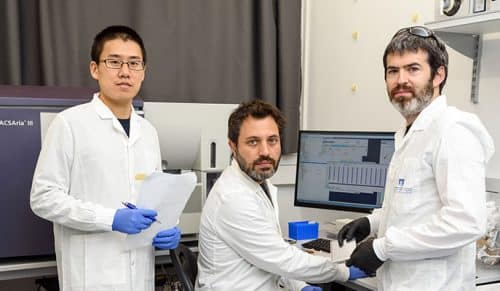A new method for scanning individual cells shows the "exhausted" cells of the immune system in a new light, and may enable the development of advanced future medicine

Why do some patients respond to immunotherapy treatments and others do not? Why do certain immune cells attack cancer tumors effectively, while immune cells of the same type "complement" the presence of the cancer cells? This is one of the most burning questions in cancer research today. Prof. Ido Amit and members of his research group Dr. Ido Yaffe, and Dr. Hanji Lee in the Department of Immunology at the Weizmann Institute of Science, together with Dr. Yaniv Lubling from the group of Prof. Amos Tani in the Department of Computer Science and Applied Mathematics recently found a tip that may To help find the answer to these burning questions, which may advance immunotherapy to a new level of efficiency and precision.
The scientists, who worked in collaboration with research student Anne van der Loen from Prof. Ton Schumacher's group and doctors from the Cancer Research Institute in the Netherlands, examined cells from cancerous tumors in a new and groundbreaking method. They isolated and scanned immune cells using a unique technology developed in Prof. Amit's laboratory, a kind of "genetic microscope" that allows to access each cell individually, and to diagnose and classify its "activity profile". In this way, it is possible to identify a "family" relationship between cells, and to examine the similarities and differences in their function in the tumor. The importance of this comes from the ability to identify specific cell profiles that are important for the response against the cancer cells.
In fact, the T cells, the most "combat" fighters of the immune system, which recognize cancer cells and can be expected to attack and kill them, are divided into different subgroups: some do do their job, but most behave as if they are tired, which allows the tumor to win its war on the immune system of the body These "tired" cells are the natural candidates to be used as tools in immunotherapy methods: they can be stimulated by giving a drug that removes their inhibitions.
It is precisely the 'lazy' cells that divide and thrive significantly more than the other cells. The notion that these cells were active and 'combat' in the past, and then simply got tired, is not necessarily true."
However, the institute's scientists discovered, through scanning tens of thousands of immune cells from cancer patients, and unique analyzes of big data (huge data) that they developed, that the "tired" cells are not tired at all. "In fact, we discovered that these cells divide and thrive significantly more than the other cells. One could perhaps say that the fatigue has a lot to do with it - the notion that these 'lazy' cells were active and 'combat' in the past, and then simply got tired, is not necessarily true," says Dr. Loebling. "This completely changes the thinking of how and in which situations they can be stimulated, and raises the possibility of developing new drugs, while utilizing new mechanisms of action," says Dr. Yaffe, who led the research.
Will future drugs that target damage to these cells instead of stimulating them be able to improve patient care? Is it possible, nevertheless, to develop a method that will turn the lazy cells into cells that will attack the cancer cells? These questions are at the center of their current research.
The immunotherapy challenge
The Nobel Prize for Medicine was awarded this year to researchers Prof. James Ellison (from the University of Texas) and Prof. Tsuko Honjo (from Kyoto University), thanks to their discoveries that led to the most advanced and promising method of cancer treatment in recent decades - immunotherapy. This method is based on the finding that the cells of the immune system that are supposed to fight and eliminate the cancer cells are "exhausted" following the continuous exposure to the tumor, and that the administration of drugs that "stimulate" them again can result in the elimination of the tumor. Despite the promise inherent in this method, today most cancer patients still do not respond to immunotherapy treatments - and therefore do not benefit from the enormous potential of this technology to eradicate the cancer by the patient's immune system.
